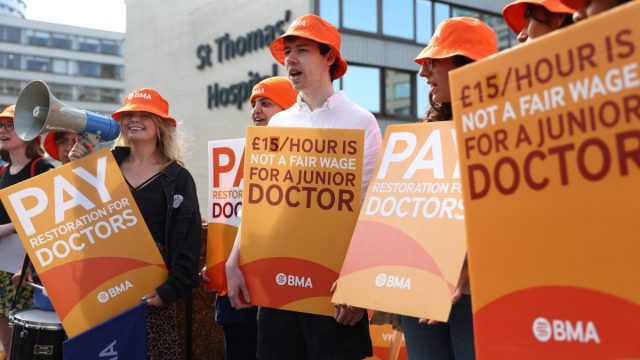A large-scale five-day strike by junior doctors (formerly known as “junior doctors”) will begin on Friday in England and Wales, which, according to experts, could lead to a “threat to patient health,” especially in emergency departments.
This is the latest escalation in the conflict between the NHS (National Health Service) leadership and the British Medical Association (BMA) over a dispute about pay. The protests will last from 7 a.m. on July 25 until 7 a.m. on July 30, with up to 50,000 junior doctors stopping work. The strike will not affect GPs, dentists or pharmacy staff.
Under the orders of the current head of NHS England, Jim Mackey, hospitals have been instructed to cancel planned procedures only in exceptional cases and with prior approval. However, the BMA warns that the new approach risks “stretching resources and damaging the quality of care.”
Patients are advised to seek help only in cases of emergency medical or psychiatric need by calling 999. If the situation is not life-threatening, they should use NHS 111 services, contact their GP or go to a pharmacy.
Earlier, doctors in England and Wales received a 5.4% pay rise, but the BMA believes that this does not compensate for a decade of pay freezes. The association is demanding a 29.2% increase to bring salaries back to 2008 levels, taking inflation into account.
Last July, an agreement was reached to increase salaries by 22% over two years, ending a long wave of protests and marking the largest pay rise in the public sector in recent years. However, the BMA claims that real wages have fallen significantly since 2008. The latest round of protests added 4% plus £750 to the base rate, an average increase of 5.4%.
British don’t back the doctors’ strike
However, according to a recent YouGov poll, support for the strike is declining. About 52% of UK residents said they were against it: 32% “strongly against,” 20% “somewhat opposed.”
The least supportive of the protesters are people over 65, while only 10% of young people aged 18 to 24 are opposed. Since May last year, support for the strikes has fallen by five percentage points.
Health Secretary Wes Streeting ruled out further pay rises this year, but said negotiations on other issues were possible: student debt, exam fees and working conditions. He warned: “The public will not forgive a strike if it causes harm to patients.”
NHS management is also expressing concern. Daniel Elkeles, chief executive of NHS Providers, emphasised: “We need to keep a cool head to defuse tensions and prevent further disruptive protests.”
Previous strikes by doctors have already led to the postponement of tens of thousands of planned operations and appointments.
